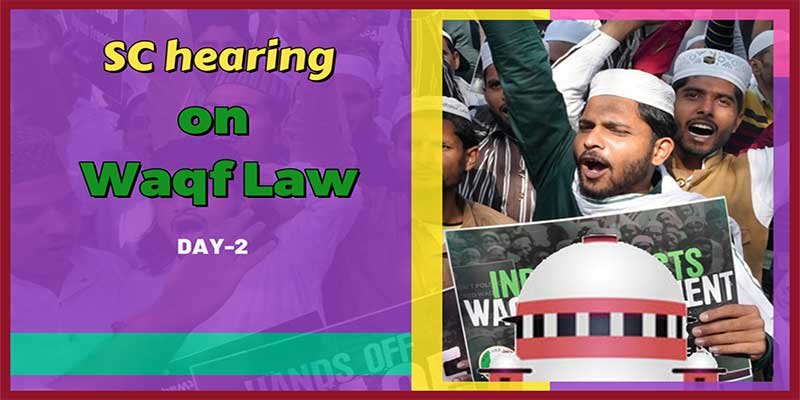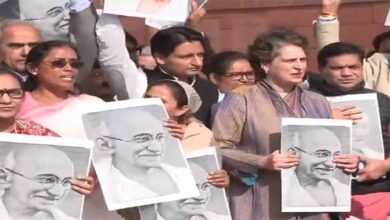Supreme Court Hearing on Waqf (Amendment) Act 2025, Day-2
The court recorded assurances from the Centre and issued directions to maintain the status quo on certain aspects until the next hearing on May 5, 2025.

Supreme Court Hearing on Waqf (Amendment) Act 2025, Day-2- The Supreme Court of India continued its hearing on a batch of petitions challenging the constitutional validity of the Waqf (Amendment) Act, 2025. The three-judge bench, led by Chief Justice of India (CJI) Sanjiv Khanna, along with Justices Sanjay Kumar and K.V. Viswanathan, addressed key concerns raised by petitioners and the Union government.
The hearing focused on interim relief, the contentious provisions of the Act, and the arguments presented by senior advocates representing both sides.
Also Read- Supreme Court Hearing on Waqf (Amendment) Act, 2025 Day-1
The court recorded assurances from the Centre and issued directions to maintain the status quo on certain aspects until the next hearing on May 5, 2025.
Background of the Waqf (Amendment) Act, 2025
The Waqf (Amendment) Act, 2025, which came into force on April 8, 2025, after receiving presidential assent on April 5, amends the Waqf Act, 1995. The Act introduces reforms aimed at improving transparency and accountability in the management of waqf properties—Islamic endowments dedicated for religious or charitable purposes. Key amendments include:
- Allowing non-Muslims to be appointed to the Central Waqf Council and State Waqf Boards.
- Removing the concept of “waqf by user,” which recognizes properties as waqf based on long-standing religious use.
- Mandating registration of waqf properties and empowering collectors to inquire into disputed properties.
- Enhancing state control over waqf administration.
Also Read- Murshidabad Protests Against the Waqf (Amendment) Act-2025
The Act has faced significant opposition, with over 70 petitions filed by opposition leaders, including AIMIM MP Asaduddin Owaisi, Congress MP Mohammad Jawed, TMC MP Mahua Moitra, and organizations like the All India Muslim Personal Law Board (AIMPLB) and Jamiat Ulama-i-Hind. Critics argue that the Act violates fundamental rights under Articles 14 (equality), 15 (non-discrimination), 25 (religious freedom), and 26 (right to manage religious affairs) of the Constitution.
Key Developments in the Hearing
The Supreme Court’s hearing on April 17 built on discussions from the previous day (April 16), where the bench had proposed a three-point interim order but deferred its issuance at the Centre’s request for more time. The following key points emerged during the hearing:
Interim Directions and Centre’s Assurances:
The court recorded the Union government’s assurance, presented by Solicitor General Tushar Mehta, that no waqf properties, including those classified as “waqf by user,” would be denotified until the next hearing on May 5, 2025.
Also Read- Hundreds Protest Against Waqf Act in Silchar, Clash with Authorities
The Centre further assured that no appointments would be made to the Central Waqf Council or State Waqf Boards under the amended provisions, particularly regarding the inclusion of non-Muslims, during this period.
The bench directed that the character of waqf properties, whether registered or declared by courts, must remain unchanged until the next hearing. These directions effectively impose a partial stay on the implementation of certain provisions, such as the inclusion of non-Muslims in waqf bodies and the denotification of waqf properties.
Court’s Observations:
The bench reiterated concerns about the removal of “waqf by user,” noting that many historical waqf properties, such as old mosques, may lack formal registration or sale deeds, making their denotification problematic. CJI Khanna emphasized that undoing “waqf by user” could have “huge consequences.”
The court questioned the Centre on the inclusion of non-Muslims in waqf bodies, asking whether Muslims could similarly be appointed to Hindu religious trusts. The bench found the Centre’s analogy—that only Muslim judges should hear waqf cases if only Muslims can serve on waqf boards—problematic.
Procedural Decisions:
The Supreme Court adjourned the matter to May 5, 2025, with the Centre directed to file its response within seven days and petitioners to submit rejoinders within five days thereafter. The court’s interim directions ensure that no waqf properties are denotified and no appointments are made to waqf bodies until the next hearing, providing temporary relief to petitioners. The bench’s decision to limit arguments and modify the case title aims to expedite the resolution of this high-stakes constitutional challenge.
The April 17, 2025, hearing marked a critical juncture in the legal battle over the Waqf (Amendment) Act, 2025. The Supreme Court balanced the petitioners’ concerns about religious autonomy and property rights with the Centre’s defense of the Act as a transparency-driven reform.
The interim directions maintain the status quo on waqf properties and appointments, reflecting the court’s cautious approach. The arguments by senior advocates, particularly Kapil Sibal’s emphasis on Article 26 and “waqf by user,” underscored the constitutional complexities at play. As the case progresses, the court’s final ruling will have significant implications for waqf governance, religious freedom, and state authority









